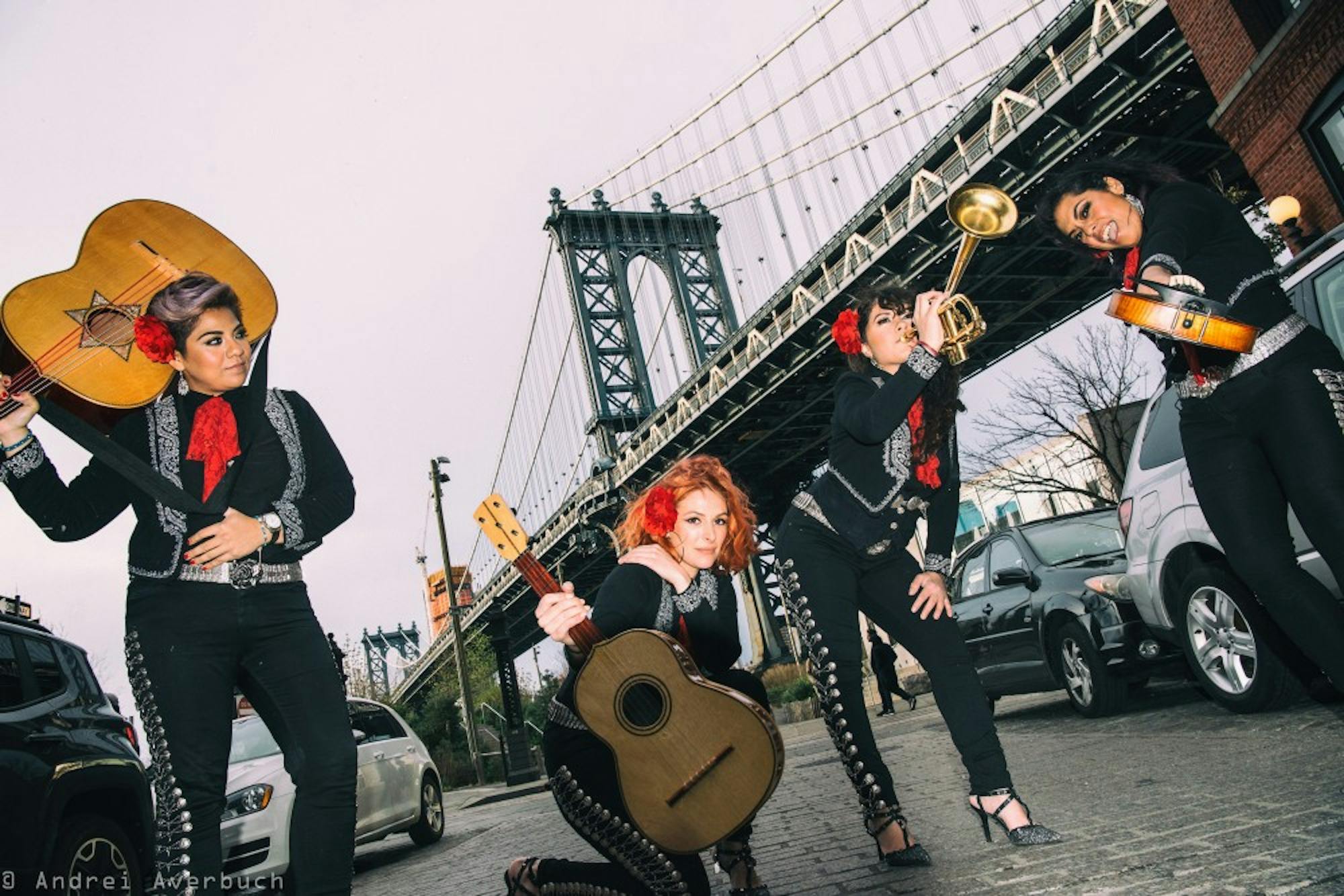The Hopkins Center for the Arts paired Ana Tijoux, a Chilean-French folk singer and rapper, with the all-female new wave “post-mariachi” band Flor de Toloache for an evening celebrating Latinx music this past Friday in Spaulding Auditorium.
Tijoux brought an infectiously exuberant energy to the stage. She was effortlessly cool, drinking wine on stage and encouraging audience participation in between swaggering rap songs. She claimed that her English was “bad,” but she nonetheless was able to communicate to the audience enough context for her music to be enjoyed even by those who do not speak Spanish. For example, Tijoux told the audience about one of her particularly personal and emotionally resonant songs about the “passing of someone dear.”
Zoe Marzi ’22 said that once she was aware that Tijoux’s act would be in Spanish, she decided to focus solely on “listening to [Tijoux’s] music and enjoying the atmosphere that the music created.” Although Marzi hasn’t seen many other shows at the Hopkins Center, she recognized the rarity of having a performer come and present material in a language other than English.
“It was really exciting to hear music that I otherwise wouldn’t normally be introduced to,” Marzi said.
Marzi added that Tijoux’s music was especially evocative for her because her lack of understanding for the lyrics allowed her to focus on emotions.
“When you don’t know the words, it’s easier to project your own emotions onto the song so it becomes a more reflective process than just listening to music,” she said.
Tijoux got the audience involved in her musical performance, asking the audience to try and make vocal effects to accompany her singing. The student section was the most boisterous and eager to play along.
“The energy [in the room] was alive,” Kiera Jackson ’22 said. “Everyone was really willing to participate when [Tijoux] made us count ‘uno, dos, tres’ even though Dartmouth’s largely Caucasian population had no idea what they were doing or saying.”
A majority of the audience were older Hanover residents, and some of them left during the intermission before the second act. For the most part however, the audience was eager to clap along and enjoy the music despite not understanding the words.
“Everyone was so eager to please [Tijoux] because she was such a lovely performer,” Jackson said.
Jackson added that the band members accompanying Tijoux were impressive as well.
“The drummer was my favorite part of the show,” Jackson said. “[He] was kind of underrated because he was standing behind her,” Jackson said.
Tijoux’s rap songs, according to the playbill, deal lyrically with political issues of colonialism and feminism. Her background as the daughter of Chilean exiles informs her music, which often tackles societal issues.
Though the lyrics were entirely in Spanish, the emotion of the musical performance was sufficient to give significance to Tijoux’s songs.
Gus Guszkowski ’22 said they enjoyed Tijoux’s performance more than Flor de Toloache’s.
“[Tijoux] very much knew how to work the crowd,” Guszkowski said. “She got everybody very hyped, and I had a lot of fun with that.”
Many residents of the Humanities Living Learning Community attended the show, and the group reached a consensus that Tijoux was undeniably vogue.
“She was almost aggressively cool,” Guszkowski said. “You look at her and think, ‘I want that jacket and that stage presence.’”
Flor de Toloache was the second act following Tijoux. A Latin Grammy-winning band, Flor de Toloache marketed themselves as “post-mariachi,” fusing traditional Mexican mariachi music with influences from jazz, hip-hop and soul. The group also performed pop songs as covers adding elements of ranchero to their renditions.
The band is highly acclaimed, having been nominated for a Latin Grammy Award in 2015 for “Best Ranchero/Mariachi Album” for their debut album. They won the award for their second album, “Las Caras Lindas,” in 2017. In the short amount of time they have been performing, they have been on “The Late Show with Stephen Colbert” and “Tiny Desk Concert,” presented by NPR.
“The very first song they played was country-mariachi fusion, which was interesting,” said Guszkowski. “Lots of melodies; I got really excited when they played Prince in a mariachi flavor.” Guzkowski added that they were appreciative of the traditional Latin songs in the set list as well.
Guszkowski does speak Spanish, which informed their appreciation of the show.
“I don’t speak Spanish well enough to get a lot out of it,” Guzkowski said. “But I did appreciate being able to catch words and phrases that helped me understand what the songs were about.”
Flor de Toloache choose their name because their music creates a transcendent vibrancy similar to the flowering of the Toloache plant, which still gets used as a key ingredient in Mexico for love potions.
The group’s effusive and energetic performance did indeed flower over the audience. For those who came to the show with little background in Latinx music, it is likely that Tijoux’s and Toloache’s performances acted as a love potion for further enjoyment of traditional and not-so-traditional Latinx music.




